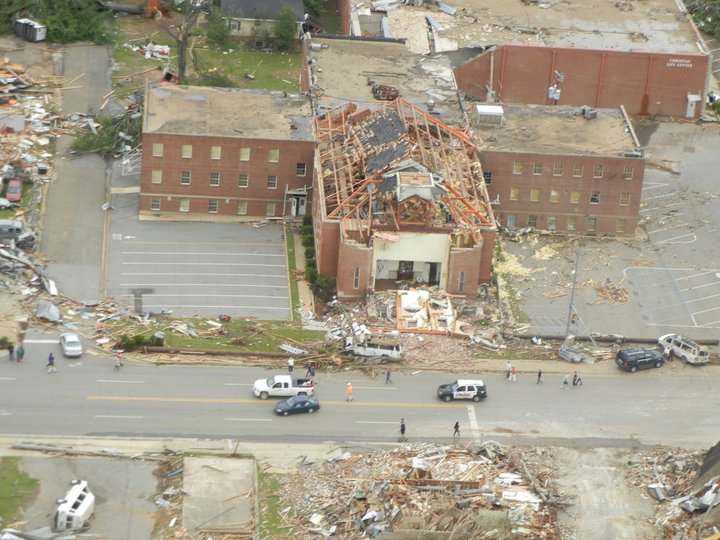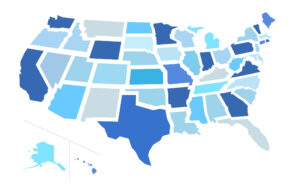
BIRMINGHAM, Ala. (BP)–One of the most devastating tornado outbreaks in the nation’s history left at least 290 people dead in six states April 27 as Southern Baptist disaster relief volunteers — already on the ground in some locations — scrambled to assess damaged church buildings and assist in disaster relief in the midst of power and telephone outages, and rubble.
In Alabama alone, more than 200 people died in 16 counties, and the governor estimated as many as half a million to a million people were left without electricity.
Tennessee was the next hardest hit with a reported 34 deaths, followed by 32 in Mississippi, 14 in Georgia, five in Virginia and one in Arkansas. Entire neighborhoods were leveled in the affected regions.
Southern Baptist Disaster Relief volunteers in Alabama already are assisting emergency response personnel in an effort to find survivors.
The Weather Channel called the outbreak the deadliest since 1974.
Rick Lance, executive director of the Alabama State Board of Missions and treasurer of the Alabama Baptist Convention, said Thursday, “This is our Katrina,” according to The Alabama Baptist newspaper.
Mel Johnson, director of disaster relief for the Alabama Baptist Convention, said disaster relief volunteers “have been asked to assist in search and rescue efforts” — a first for the Alabama volunteers.
Johnson was one of about a dozen Baptist state convention disaster relief leaders who participated in a Thursday morning conference call coordinated by the North American Mission Board. State representatives shared about damage in their states while others offered resources and volunteers when needed.
“Entire communities disappeared,” Johnson said. “Many hospitals, police departments, local fire departments all sustained damage. At one campsite campers were picked up and swept into a lake.
“We have teams that started responding yesterday,” Johnson said. “They have had to cut their way into these areas.”
Johnson said after search and rescue, their top priority is establishing several feeding sites near large population centers so they can begin serving hot meals to victims.
Southern Baptist disaster relief leaders in Mississippi, Tennessee, Georgia, North Carolina and Virginia also reported damage from Wednesday’s outbreak. The lack of electricity in Alabama is making meal distribution a high priority.
Lance, the Alabama state exec, also said via Twitter Thursday that he was thankful for a call from Southern Baptist Executive Committee president Frank Page pledging prayer and other support. The SBC family is needed in Alabama, Lance said.
President Obama planned to visit Alabama on Friday to view the damage and meet with state and local officials as well as families affected by the storms.
Mickey Caison, NAMB’s Disaster Relief coordinator, called it the “storm you never want to see.”
“Our top priority is to help people just get through the next few days and weeks. After that, Southern Baptists will be called upon to help with the longer-term effort to remove debris and help victims rebuild.”
The tornados came as Southern Baptists volunteers were also in the midst of responding to floods in Kentucky, Missouri and Arkansas as well as earlier deadly tornadoes in North Carolina.
NAMB president Kevin Ezell called on Southern Baptists to pray “but I would also like to ask every Southern Baptist and every church to donate to our disaster relief efforts.” Ezell said people can give at Namb.net to a specially designated fund for tornado and flood victims that will ensure that 100 percent of donations go directly to help disaster victims. Donations also can be made to the disaster relief unit of each state convention. (Alabama’s is online at www.alsbom.org/feature5.)
“God has blessed Southern Baptists with more trained disaster relief volunteers and more disaster relief units than any other ministry or organization,” Ezell said. “Now is a time to respond generously with our resources and our services to meet physical and spiritual needs.”
At least one strong tornado cut a path through Tuscaloosa, Ala., killing dozens, destroying hundreds of homes and businesses and leaving roads impassable. Mayor Walter Maddox said the storm obliterated blocks of the city, causing unprecedented devastation to the city’s infrastructure.
“I don’t know how anyone survived,” Maddox told CNN. “We’re used to tornadoes here in Tuscaloosa. It’s part of growing up. But when you look at the path of destruction that’s likely five to seven miles long in an area half a mile to a mile wide … it’s an amazing scene. There’s parts of the city I don’t recognize, and that’s someone that’s lived here his entire life.”
Classes were canceled Thursday at the University of Alabama, and some of the school’s off-campus residents were among the dead.
The same tornado that hit Tuscaloosa also hit Birmingham, Ala., causing significant damage with a Red Cross spokesman telling CNN the number of ambulances on the street there was “just like taxicabs in New York.”
It is not known how many church buildings in Alabama and elsewhere were damaged or destroyed, but reports kept coming in through the day Thursday.
Alberta Baptist Church in Tuscaloosa was heavily damaged, and in rural Phil Campbell, Ala. — 90 miles north of Tuscaloosa — Mountain View Baptist Church was destroyed. Other Alabama churches that sustained heavy damage included First Baptist Church in Cullman, Eastside Baptist Church in Cullman, and First Baptist Church in Fultondale.
In Mississippi, Smithville Baptist Church in the northeastern part of the state and the neighboring United Methodist Church “were both destroyed,” according to the Northeast Mississippi Daily Journal. “The Baptist church had an inverted Chevy truck on top of its roof where its offices once stood. The church bus lay on its side in a nearby ditch,” the newspaper said.
No building along a mile-long stretch through town was unaffected, and most were destroyed in Smithville, a town with a population of 900 people. Homes with bodies in them were marked with two orange Xs.
Marsha Houck, a nurse practitioner, told the Daily Journal, “People are walking around in shock with broken arms and all sorts of injuries, and folks are looking for their loved ones.”
In Georgia, Shorter University, affiliated with the Georgia Baptist Convention, was cleaning up Thursday after about 20 trees were down on campus. Disaster relief teams from the state convention were onsite to help, and classes were canceled. At least one window in the university’s administration building was knocked out by a fallen tree, and a nearby garage was destroyed.
In the northwest corner of the state, First Baptist Ringgold was reportedly hit by a tornado after the twister destroyed several businesses at a nearby interstate exit — killing seven — before ripping up ball fields and buildings at Ringgold High and Middle schools, The Christian Index newspaper in Georgia reported.
–30–
Compiled by Baptist Press assistant editor Erin Roach. Donations can be made online at Namb.net, or to state conventions’ disaster units. At NAMB.net, you can also view and download a video message from NAMB President Kevin Ezell about how Southern Baptists are responding to tornado and flood victims.















